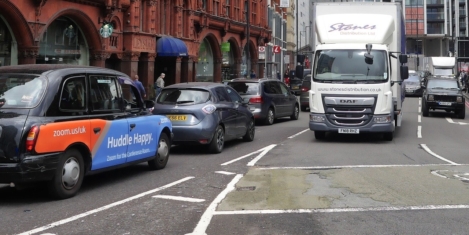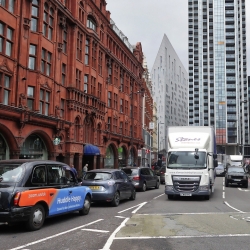To provide the best experiences, we use technologies like cookies to store and/or access device information. Consenting to these technologies will allow us to process data such as browsing behaviour or unique IDs on this site. Not consenting or withdrawing consent, may adversely affect certain features and functions.
The technical storage or access is strictly necessary for the legitimate purpose of enabling the use of a specific service explicitly requested by the subscriber or user, or for the sole purpose of carrying out the transmission of a communication over an electronic communications network.
The technical storage or access is necessary for the legitimate purpose of storing preferences that are not requested by the subscriber or user.
The technical storage or access that is used exclusively for statistical purposes.
The technical storage or access that is used exclusively for anonymous statistical purposes. Without a subpoena, voluntary compliance on the part of your Internet Service Provider, or additional records from a third party, information stored or retrieved for this purpose alone cannot usually be used to identify you.
The technical storage or access is required to create user profiles to send advertising, or to track the user on a website or across several websites for similar marketing purposes.
 Nearly two-thirds of financial services leaders expect to be mass adopters of AI in two years compared to just 16 percent harnessing it today, a survey from the World Economic Forum and the Cambridge Centre for Alternative Finance (CCAF) claims. This is despite fears around AI, with 58 percent of the 150 senior executives surveyed expecting it to worsen discrimination in the sector and the same number expecting privacy breaches to increase. (more…)
Nearly two-thirds of financial services leaders expect to be mass adopters of AI in two years compared to just 16 percent harnessing it today, a survey from the World Economic Forum and the Cambridge Centre for Alternative Finance (CCAF) claims. This is despite fears around AI, with 58 percent of the 150 senior executives surveyed expecting it to worsen discrimination in the sector and the same number expecting privacy breaches to increase. (more…)







 Outdoor workers in the capital are exposed to 15 percent more pollution than the average Londoner, new
Outdoor workers in the capital are exposed to 15 percent more pollution than the average Londoner, new 
 Six in ten new cars must be electric by 2030 yet a third of people have told researchers they won’t ever buy an electric vehicle. The UK government’s current policy is to insist that by 2030, all new cars and vans sold in the UK should be zero-emissions capable – that means battery electric, plug-in hybrid electric or hydrogen.
Six in ten new cars must be electric by 2030 yet a third of people have told researchers they won’t ever buy an electric vehicle. The UK government’s current policy is to insist that by 2030, all new cars and vans sold in the UK should be zero-emissions capable – that means battery electric, plug-in hybrid electric or hydrogen. 
 Policy makers should resist claims by Uber that its drivers fall into a middle ground between traditional employees and independent contractors, a new study says. The research report,
Policy makers should resist claims by Uber that its drivers fall into a middle ground between traditional employees and independent contractors, a new study says. The research report, 
 Communicating a business’s “employee value proposition” or EPV – the package of rewards that it offers in return for the person’s performance at work – is having an increasingly positive impact on employee engagement, retention and recruitment, research has claimed.
Communicating a business’s “employee value proposition” or EPV – the package of rewards that it offers in return for the person’s performance at work – is having an increasingly positive impact on employee engagement, retention and recruitment, research has claimed. 
 Policy makers should beware of classifying all gig economy workers as “employees”, a new research report has claimed. Such workers vary in age, income and education in a similar way to the traditional workforce and crafting regulations that treat both fully committed and occasional gig workers as one group is unlikely to be an efficient solution, the
Policy makers should beware of classifying all gig economy workers as “employees”, a new research report has claimed. Such workers vary in age, income and education in a similar way to the traditional workforce and crafting regulations that treat both fully committed and occasional gig workers as one group is unlikely to be an efficient solution, the 
 Many companies are moving away from long-term overseas placements in favour of short-term transfers, a report has suggested. To reduce costs and meet changing business and worker needs, firms are shifting from typical transfers of one to three years to moves of around three to 12 months,
Many companies are moving away from long-term overseas placements in favour of short-term transfers, a report has suggested. To reduce costs and meet changing business and worker needs, firms are shifting from typical transfers of one to three years to moves of around three to 12 months, 




 Following reports that job applications on the first working Monday of the New Year spiked by 89 percent compared to the average Monday in December, many UK businesses may be missing a trick in their efforts to retain staff, new research has suggested. When researchers commissioned by
Following reports that job applications on the first working Monday of the New Year spiked by 89 percent compared to the average Monday in December, many UK businesses may be missing a trick in their efforts to retain staff, new research has suggested. When researchers commissioned by 







February 5, 2020
Bridging the gap between the reality and perception of engagement
by Callum Gill • Comment, Flexible working, Technology, Workplace